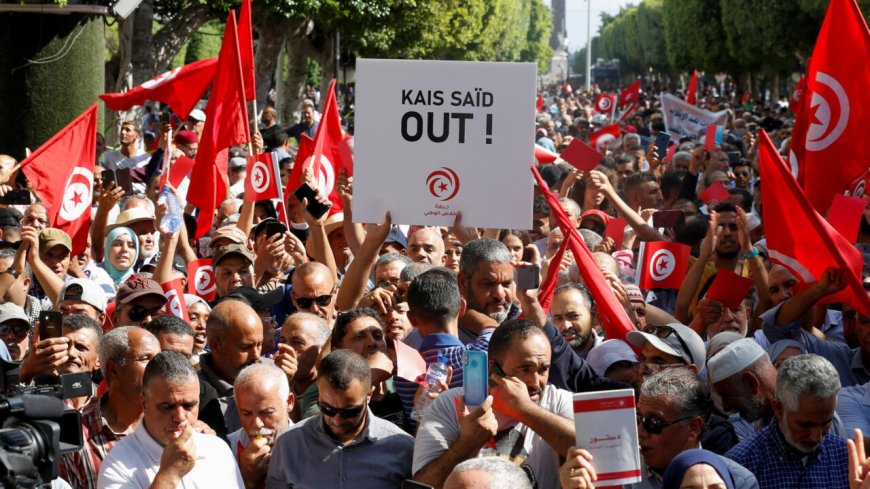Tunisia on the Brink: Protesters Denounce President Saied, Call the Country an “Open-Air Prison”
Hundreds of Tunisians marched through Tunis on July 25, denouncing President Kais Saied’s rule as authoritarian and declaring their nation an “open‑air prison”. The protests mark four years since he seized power.

hundreds of Tunisian activists staged a powerful protest in the capital, Tunis, condemning President Kais Saied’s four-year rule as authoritarian and declaring the nation an “open-air prison”. Marching along Habib Bourguiba Avenue, demonstrators demanded the release of jailed political prisoners, including opposition figures, journalists, and lawyers. This long-shadowed day—once Tunisia’s Republic Day—has become a painful anniversary of Saied’s self‑coup in 2021, which critics argue dismantled the democratic foundations of the Arab Spring’s sole success story AP News+13Reuters+13Arab News+13.
Protesters' Grievances: "Republic Is a Large Prison"
Under slogans like “no fear, no terror … streets belong to the people” and “the people want the fall of the regime,” activists marched in a show of resilience and defiance. Thousands chanted for the release of detained leaders such as Rached Ghannouchi (Ennahda party), Abir Moussi (Free Destourian Party), and Sonia Dahmani, calling out the regime’s politically motivated trials and suppression of dissent Reuters+5Reuters+5SRN News+5.
The protesters described Tunisia today as an “open-air prison,” where even those not jailed live in constant fear of arrest. Saib Souab, son of imprisoned lawyer Ahmed Souab, captured the mood poignantly: “Prisons are crowded with Saied’s opponents… Even those not behind bars live in a state of temporary freedom” Reuters+4Reuters+4Arab News+4.
The Legacy of Saied’s Power Grab
On July 25, 2021, President Saied unilaterally suspended the elected parliament, dismissed the prime minister, and assumed executive authority—actions widely considered a self‑coup Reuters+15Wikipedia+15Wikipedia+15. In February 2022, he dissolved the Supreme Judicial Council and removed scores of judges, further consolidating his grip over Tunisia’s institutional pillars Reuters+8Wikipedia+8Reuters+8.
The 2022 constitutional referendum bypassed broad public debate and expanded presidential powers, while elections were largely boycotted amid accusations of democratic manipulation Wikipedia.
Crackdown on Civil Society
Since Saied’s takeover, civil society has come under intense pressure. A Human Rights Watch report documented a sharp rise in arrests of activists, lawyers, judges, and journalists under laws like Decree-Law 54, broadly used to curb so-called “false information” YouTube+15AP News+15Reuters+15. Notable arrests include Cherifa Riahi, a human rights activist imprisoned without charge—a case emblematic of the broader repression of civic space Reuters.
Organizations such as I Watch and the Tunisian General Labour Union have been stripped of resources and frequently raided, radically diminishing their capacity to mobilise or monitor public affairs Reuters+1Wikipedia+1.
Political Prisoners and Judicial Sentencing
Tunisian courts have jailed high-profile figures in lengthy trials accused of “conspiracy against state security.” Rached Ghannouchi received an additional 14-year sentence, now totaling 27 years, while others, including former officials and journalists, received sentences ranging from 12 to 35 years Wikipedia+5Reuters+5Wikipedia+5. Critics argue these verdicts serve to legitimize political repression under Republic-era legal frameworks.
Opposition Response and the National Salvation Front
Despite arrests of leaders like Ghannouchi and Moussi, opposition forces remain active under platforms like the National Salvation Front (NSFT)—a loose coalition including Ennahda, Amal, and other anti-Saied factions. The Front has consistently denounced the 2021 decrees as unconstitutional and called for restoration of democratic governance and electoral integrity SRN News+7Wikipedia+7Reuters+7.
The Socio-Economic and Political Climate
Tunisia’s democratic erosion occurs amid economic stagnation, high youth unemployment, and mounting public frustration. Saied’s government, prioritizing executive power consolidation, has struggled to build public consensus for reform and instead relied on legal coercion and security force deployments to maintain control.
International pressure, including from the EU and the United States, has grown. Human Rights Watch and Amnesty International have repeatedly highlighted Tunisia’s democratic regression and urged political reforms before external support is withdrawn or reprioritized AP NewsReuters.
Civil Society Voices: Courage Amid Repression
Activists remain defiant. Despite raids, harassment, and arrests, many continue organizing through networks abroad and online platforms. Public demonstrations like July 25 serve as rare visibility milestones—moral stands that challenge the regime’s narrative.
Cherifa Riahi’s case continues to resonate: detained months after giving birth, still imprisoned without charges. As one rights advocate told Reuters, “Some of Tunisia’s last surviving democratic gains are at risk” Reuters.
Regional and Global Reactions
Tunisia’s drift toward authoritarianism has drawn concern from regional bodies. The African Union and UN human rights officials have called for restraint and respect for civil liberties. Western governments, increasingly wary of human rights violations, may condition development assistance or migration cooperation on progress toward democratic restoration.
For now, Tunisia stands at a critical crossroads: slipping further into centralised autocracy or rebounding under renewed civic and international pressure.
What Lies Ahead
-
Political Prisoner Releases: Protesters demand release of high-profile detainees like Ghannouchi, Moussi, and others.
-
Judicial Independence: Restoration of an operational Supreme Judicial Council and fair trials for political defendants.
-
Electoral Roadmap: The opposition calls for reform of the electoral commission and transparent elections.
-
Civil Society Revival: Legal protections and resource restoration for NGOs and rights groups.
-
International Leverage: Potential reevaluation of Tunisia-EU migration agreements and aid packages tied to democratic reforms.
Conclusion
Tunisia’s July 25 protests mark a symbolic reckoning: a country once hailed as the Arab Spring’s beacon is now described as an “open-air prison.” Driven by oppression and legal repression, hundreds marched through Tunis with memories of freedom now dated.
As President Saied doubles down on his centralized rule, the tension intensifies between resistance and repression. Whether Tunisia will reclaim its democratic promise or consolidate its authoritarian slide depends on internal mobilization and external pressure. Today’s chants may be Tunisia’s voice—one that demands to be heard.




















































